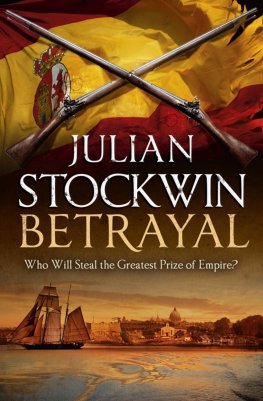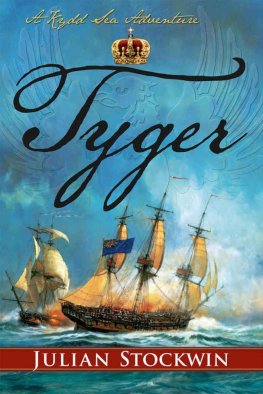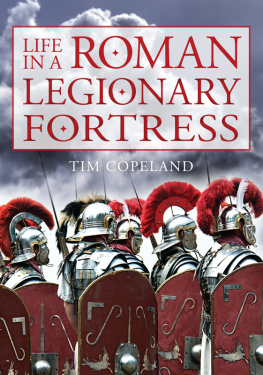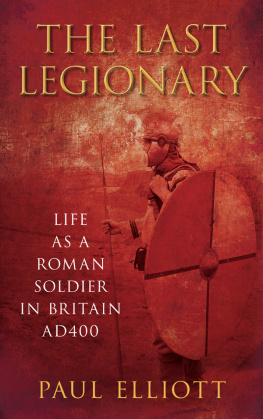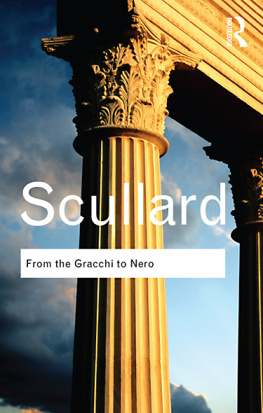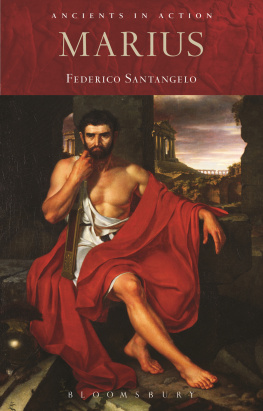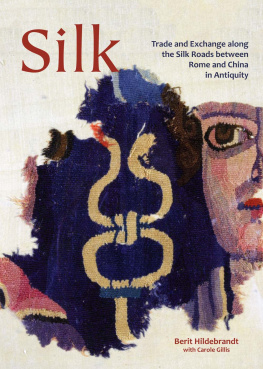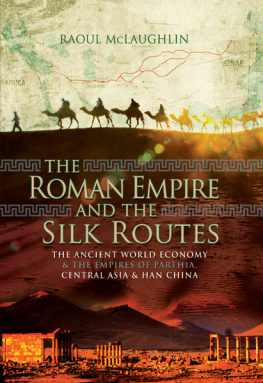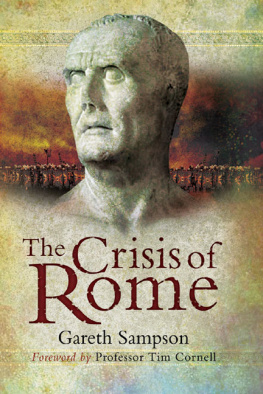
Julian Stockwin
THE SILK TREE
The genesis for The Silk Tree came when my wife, Kathy, and I were in Istanbul doing location research. She discovered a rather lovely silk scarf in the Kapali Carsi, the ancient Grand Bazaar. While she was chatting with the merchant I idly wondered how silk had been brought from China to the West. Intrigued, I did some research on the subject and the creative juices started flowing I knew I had a story I had to tell! Part of the task of a writer of historical fiction is to recreate city landscapes of the past in his minds eye and for The Silk Tree this meant sixth-century Constantinople (as Istanbul was called then).
So, what is known about the secret of silk? China kept the secret for over 1000 years and legend there tells of a princess who smuggled eggs out in her headdress when married to a prince of Khotan. In the West, accounts generally agree that it was two monks that returned from China in 551 AD with the secret of silk, and although documents vary in their details each providing tantalising references and with no one version standing out as definitive I have based my novel on these. Many of the characters in the book did exist and it was fascinating researching their lives.
Top of a novelists desire when writing is that his readers enjoy the book, but I also hope The Silk Tree has opened a window to a world that we in the twenty-first century can only wonder at.
At about the same time there came certain monks. They promised Emperor Justinian Augustus that they would provide the means for making silk from Sinae where they had learnt the art. After they had announced these tidings, they returned thither and brought back eggs of a worm that feeds on leaves of the mulberry. Thus began the art of making silk in the Roman Empire.

DRAMATIS PERSONAE
* indicates fictional character
*Aldar caravan escort soldier
Antonina, Lady wife of Belisarius
*Arif young cameleer
Barsymes, Peter Count of the Sacred Largesse under Justinian
Belisarius Roman general under Justinian
Chang Le, Princess wife of Gokturk Lord Bumin
*Dao Pa mystic
*Grotius Nabatean merchant
Hao chancellor at court of usurper Wen Hsuan of Northern Chi
Hsiao Ching Emperor of the Eastern Wei, overthrown by warlord Kao
John the Cappadocian disgraced former tax collector for Justinian
Justinian Justinian I, Emperor of the Eastern Roman Empire, ruled 527-565 AD
Kao Yang warlord who usurps emperor, becomes Emperor Wen Hsuan
Kao Yeh Crown Prince of Chi
*Khosrau torturer in employ of Marcellus
*Korkut Rouran silk merchant
*Kuo Ying Meis uncle in Chang An
*Kuo Ming Lai chancellor and grand chamberlain to Emperor Hsiao Ching
*Kuo Ying Mei, Lady daughter of Kuo Ming Lai, aka Lady Peng, aka the Ice Queen
*Lai Tai Yi Gold Lily lady-in-waiting to Ying Mei, Ah Lai familiar name
*Liu court eunuch
Lord Bumin the Khagan of the Gokturks
*Mansur caravan master and trader with the barbarians
Marcellus Count of Excubitors at court of Justinian
*Marius Quintus Carus Marius, Roman legionary, aka Brother Matthew, aka Ma Lai Ssu
*Master Feng torturer
*Messalia merchant in Constantinople
Narses grand chamberlain to Justinian
*Nemasus compulsor (tax extraction agent) of Justinian
*Nepos chariot driver for Blues faction
*Nicander Nicodorus of Leptis Magna, Greek incense merchant aka Brother Paul, Ni Kan Ta
Peter the Patrician Master of the Offices, the court of Justinian
*Priscus chariot driver for Greens faction
Procopius Byzantine scholar and court historian at the time
*Su Li Sogdian caravan master based in Chang An
*Sueva Spanish cargo agent in Brundisium
*Taw Vandak Tibetan lama of the oasis kingdoms
Totila leader of Ostrogoths
Tsao Fu court poet
*Velch compulsor (tax extraction agent) of Justinian
*Wang chief scribe to Kuo
Wen Hsuan new Emperor of Northern Chi; overthrew Hsiao Ching of Eastern Wei
Wu Kuo Chin general of Imperial Bannermen
*Wulfstan northern barbarian guard, John the Cappodician residence
*Ya Uighur commander of caravan escort
*Yi beastmaster at court of Emperor Wen Hsuan
*Yuan court eunuch
*Yulduz caravan master
*Zarina Korkuts wife
The dilapidated building on the outskirts of Rome stank of farm slurry and rank fear hung heavily on the air. Nicanders stomach contorted painfully with hunger. He rubbed his legs, cursing the sparse, angular timbers of the hayloft where he had been hiding since the day before.
He glanced below. In the fitful moonlight coming through the holed roof he could see the three farmhands still cowering in a corner. Next to them a mother rocked her infant. An older child stood close, her eyes flashing fearfully at every sound.
Now the old man was dead. His two slaves squatted next to the body, sunk in a stupor of misery. At least there would be no more of his tortured whimpering. He wore a toga, making him out to be a patrician of sorts, but it hadnt saved him from a brutal, casual hacking by the invaders before he had managed to flee.
Outside in the darkness a distant wolf howled. A mourning for the travails of a proud city falling to the forces of darkness. Nicander shivered at the flesh-crawling sound. In the Year of Our Lord 549 a great empire was now meeting its end.
He hadnt heard any drunken laughter or sounds of rampaging destruction from the farmhouse for some time but the nearby villa was a different matter. The Ostrogoths were again busy at their plunder there, but if they heard noise they would come looking
He eased more into the shadows. If they broke in, would they be content with butchering the half a dozen below and not glance up? He caught himself the little group were fellow human beings. But what could he do? He was just one man without so much as a knife. They were strangers; did he owe them anything? Coldly, he concluded that they were in no different position to himself, helpless before the flooding tide of barbarians. Therefore, like him, they must take their chances with whatever scraps of fortune the gods threw their way.
It had all happened so fast. The capital had long moved to Constantinople while the ancient city of Rome had declined and decayed. However, the Emperor in the East, Justinian, had been increasingly successful in his bid to restore the old glories of Rome. He had unleashed the gifted general Belisarius on the Huns, Goths and Ostrogoths and other enemies until the populace felt they could breathe easily. But then he had unaccountably recalled his general, in a fit of jealousy, some said. The beaten hordes had seized their chance and struck back, the wild and cunning Totila of the Ostrogoths thrusting aside the leaderless army to take Rome itself.
Nicander would never forget that night. The rumour had spread that traitors had opened the gates to the Ostrogoths. Panic-stricken crowds scattered before crazed horsemen wielding axes and swords, screaming in bloodlust. An unstoppable flood came on and on, fanning out among the ancient magnificence to plunder and destroy. The wise had hidden. Those witless with fear who had not were mercilessly run down and killed. Females were raped in full view on the street.
Hoarse yells, screaming, flames; the reek of destruction drifting in a choking haze. The chaos and carnage had never abated.
Next page

